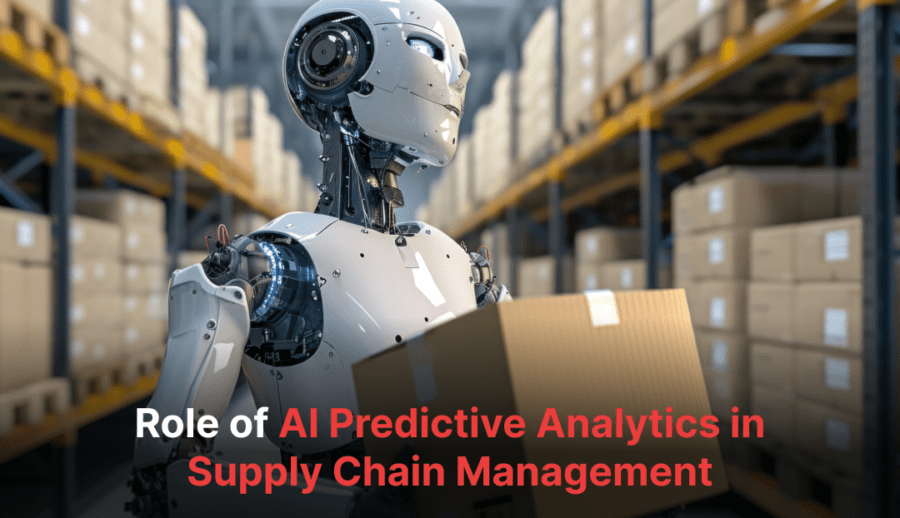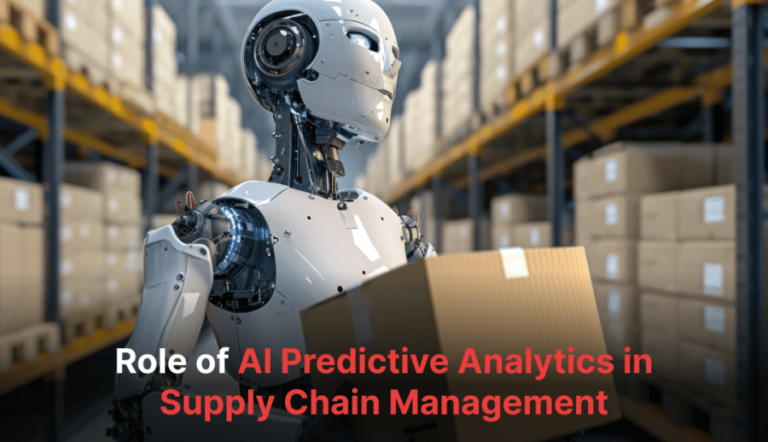

Supply chain management needs to be consistent and efficient in any industry. The system of procurement, operations management, logistics, and marketing channels that helps transform raw materials into finished products and ship them to their end consumers is known as a supply chain management system. Since the entire system constitutes a supply chain, you can understand why supply chain management is crucial for an organization. The global supply chain management market size was valued at USD 23.58 billion in 2023. The market is expected to grow by $26.25 billion The export volume of consumer goods is expected to grow from 2024 to USD 63.77 billion by 2032, at a CAGR of 11.7% during the forecast period. In this article, we will see the role of AI predictive analytics in improving supply chain management. We will also go through some additional details such as benefits and challenges, and finally conclude the entire discussion.
Despite all the supply chain management techniques, there are still many factors that can affect the supply chain. In large organizations, a large amount of data is collected on a daily basis that cannot be analyzed to extract insights. Since every organization has its own data analysis tools, it is not enough to properly manage all the stages and data in the supply chain. Certain aspects such as forecasting, market trends, quality, maintenance, errors, etc. can affect the efficiency and productivity of an organization if not managed properly.
To improve supply chain management, there is a tool or technology that is AI predictive analytics. This is one of the best technologies that can improve supply chain management within an organization. AI Predictive analysis Predicts future trends and events using machine learning and statistical algorithms. By looking at past data, businesses can predict risks and disruptions and take proactive steps to mitigate them. Anticipate likely supplier delays and disruptions. This can improve supply chain management overall.
As you know, artificial intelligence is the best technology that has been developed in the last few decades. The global predictive AI market is expected to reach a valuation of USD 108.0 billion by 2033, with a stable compound annual growth rate (CAGR) of 21.9% over the next ten years. In 2023, the net revenue generated by the market was nearly USD 14.9 billion, and is expected to reach USD 18.2 billion in 2024. These are impressive numbers and they also guarantee a bright future for AI and AI predictive analytics.
According to a recent Gartner study, organizations that adopt AI and predictive analytics in their supply chain operations can expect an average of 20% reduction in supply chain costs and a 10% increase in revenue by 2023. Additionally, statistics indicate that more than 79% of companies with high-performing supply chains, they achieve above-average revenue growth in their respective industries.
What is predictive analytics in supply chain management?
AI predictive analytics is an advanced analytics that uses historical data along with statistical modeling, data mining, and machine learning to predict future events. To detect trends in this data and identify opportunities and dangers, businesses use predictive analytics. This can be very useful in supply chain management as it allows the business to predict market trends, forecasting, data analysis, and reporting at a very fast pace. Manually analyzing data and making forecasts can be a very time-consuming process whereas with AI predictive analytics, all this can be done in no time.
How can predictive analytics improve supply chain management?
Procurement and supplier management procedures can improve AI Predictive AnalyticsPredictive analytics algorithms can find high-performing suppliers, get better terms, and make the best sourcing choices by looking at supplier performance data, market trends, and other relevant information. You can also get the right insights to track your supply chain performance, using IoT solutions, which help to strengthen weak points. This increases the efficiency and productivity of the company. There are many other benefits that we will see in the next paragraph.
Benefits of Predictive Analytics in Supply Chain Management
AI predictive analytics offers many benefits for supply chain management. Here are some key benefits mentioned below
1) Better inventory optimization
Businesses can improve inventory level optimization through the use of AI-based predictive analytics, which involves pattern recognition, demand data analysis, and consideration of seasonality, promotions, and other relevant aspects. This reduces storage costs, avoids overstocking or understocking, and improves cash flow. Overall, inventory management can be improved through this technology that has an overall positive impact on supply chain management.
2) Forecasting and planning
Forecasting is a very important aspect because it allows businesses to make decisions quickly. To provide accurate estimates of demand, artificial intelligence (AI) systems look at past sales data, industry trends, and external variables. This helps businesses better satisfy their customers by limiting stockouts and reducing excess inventory by allowing them to adapt their production, procurement, and inventory management procedures to the expected demand.
3) Improve supply chain visibility
AI-powered predictive analytics solutions provide businesses with real-time visibility across the entire supply chain, allowing them to anticipate and prevent potential disruptions before they occur. Bottlenecks, delays, or supply chain disruptions can be predicted by predictive analytics models, which enable effective risk management and contingency planning. This improves overall supply chain visibility.
4) Prediction of customer behavior and experience
Knowing customer behavior is important for a business because it can help you better understand customers and their needs. Without proper insights, it is not possible to better understand your customer. Businesses can optimize their marketing and sales efforts by using AI-based predictive analytics to anticipate their customers’ behavior. Personalized services and recommendations also improve the customer experience.
5) Supply chain security
Security is also important because a business holds a lot of confidential data related to the organization and customers. This data can be sensitive in various ways and can disrupt supply chain management if passed to the wrong hands. AI predictive analytics can predict any cyberattack in the initial phase. This helps organizations take preventive measures before the damage is too much. This also helps in improving supply chain management.
The Challenges of AI Predictive Analytics
We have seen many benefits of AI predictive analytics for supply chain management, but there are also some challenges. Here are some of them mentioned below.
- Predictive AI analytics can lead to overfitting and outdated predictions. It is essential to update the AI algorithm over time, otherwise it can be a challenge for organizations.
- The initial cost of implementing AI predictive analytics requires a lot of capital, which could also be a challenge for many organizations.
- AI bias characteristics could pose a challenge as the accuracy brought by AI predictive analytics could be biased against the organization’s regulations.
Last words
It is now very important to integrate AI predictive analytics in supply chain management to stay ahead of the competition in this fast-paced world. Organizations can achieve unprecedented levels of productivity, cost savings, and customer satisfaction by using these technologies. How supply chain management can be improved by using AI and predictive analytics. Which shows the potential to completely transform the way businesses operate. Companies that do not adopt these technologies run the risk of lagging behind their competitors. The time has come for businesses to use AI predictive analytics in supply chain management to create a more robust and efficient ecosystem.


